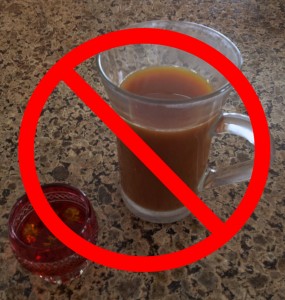“And again, hot drinks are not for the body or belly.”
─ Doctrine & Covenants 89:9
My wife Ptarmi comes from a close-knit family, the Stones. Unlike the Kilgores, the Stones family is large in number and deeply religious, with membership in the Church of Jesus Christ of Latter Day Saints (LDS) going back several generations. The Stones visit each other often and get together for annual summer reunions.
As a Bright and stout atheist, I am the only non-Mormon in Ptarmi’s immediate family, but I’ve been accepted without bias. In fact, Ptarmi’s mother is German and she held on to her Lutheran affiliation for years before converting to the LDS church, so Ptarmi’s parents and siblings really understand that people believe in different things and that’s okay. I assumed this understanding continues down to the nieces and nephews as well.
Several years ago at a Stones Family Reunion, I was strolling through the woods with my 7 year-old nephew Tanner. Ptarmi had given me an iced coffee drink as a special treat, and I sipped it through a straw as we walked. At one point, Tanner looked up at me and said,
“Uncle Ken, you know our bodies are our temples.”
Between sips, I muttered, “Yeah, that’s a good way to put it.”
“Then you know you shouldn’t be drinking coffee.”
Coming suddenly from baby-faced Tanner, the admonishment stunned me for a moment. My head whirled with many ideas for a proper response, and I was surprised that some of them weren’t very nice. Where did such negative reactions come from? He’s just a child, parroting what he’s been taught since birth, right? I’m adult, rational and secure—so why am I feeling defensive?
Perhaps, for an instant, I sympathized with his point of view that coffee might be unhealthy and I felt the need to justify drinking it. Or was I annoyed about being put in a position to defend my beliefs again, like I had to in junior high school? Caught up in analyzing my initial private reaction, I nearly missed the opportunity to expose Tanner to my worldview and hints of broader diversity and self-determination.
“Well, Tanner, just like there are many different kinds of temples in the world, there are different foods and drinks that fit people’s bodies. For me, coffee works just right if I don’t drink too much—or too little—of it.”
Tanner’s view comes from health laws called the Word of Wisdom, given in the LDS Doctrine & Covenants. Among other things, Mormons refrain from “hot drinks”, meaning coffee and tea. But interpretation varies widely, so some LDS members include iced coffee drinks in the prohibition while others don’t, some will eat coffee ice cream while others won’t, and herbal tea is okay for most but few think green tea is.
Like some Jews who assert without any scriptual basis that their dietary laws against pork were meant to prevent trichinosis, many Mormons assume that the proscription against coffee and tea are actually directed at caffeine, although there is no doctrinal support for the assumption. Such attempts to rationalize religious health laws are usually pointless, since scriptural and doctrinal references are silent on the reasons for the laws.
Rather, members and non-members should simply accept the bans as rules of membership for that religion—obeying the rules is one definition of membership. The practical reasons for the bans don’t matter and quibbling about why coffee, or pork, or beef, or some other substance isn’t allowed does little to advance discussion and understanding between religious members and non-members.


I don’t suppose your extended family would appreciate it, but one thing to say is that you like to keep up with the unfolding science of what’s most healthful to eat and drink, and that coffee has been found to be just fine for most people.
Good comment, and in fact, there is sufficient literature now to support the idea of coffee as a health-promoting beverage for many people (of course, not all).
I would want to emphasize that much of our knowledge-base is modifiable and based on our acquisition of more detailed information as societies develop. We must be allowed and encouraged to modify our knowledge as this information is presented to us, and our understanding of the health effects of coffee is a good example.
Great name Utahpia! As soon as I saw this name, it was an easy guess that you are surrounded by Mormons and I know that is hard; good people but way too eager to share their beliefs with others about the way THEY should believe too.
It’s awkward when it is a younger family member who raises those issues. I left the LDS and have become anathema to some of my grandchildren, as though at my age I should not be allowed to change my mind. The Word of Wisdom issues that arise are particularly tricky with the grandchildren because I don’t want to be seen as the one who sent them on the ‘road to hell’, yet I want to be able to drink any adult beverage I choose without censure. I said to one grandchild who commented on how yukky it was that a man was smoking and how dangerous that is – “It is his choice. Cancer is something to be concerned about, but it is HIS life and each of us has the agency to decide for ourselves. I no longer believe the Word of Wisdom, but I choose NOT to smoke.” Agency is church doctrine but not church practice.
I enjoyed your essay and the way you dealt with your nephew; it can get under your skin to be told by a child what you should and shouldn’t do and you handled it like an adult – good for you.